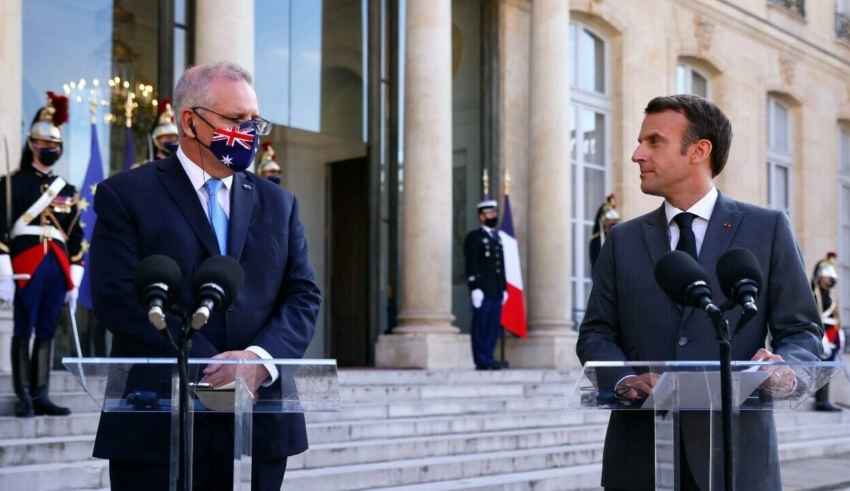
A month ago was announced the indo-pacific security pact, a partnership between Australia, USA and UK, in order for the Australian Navy to acquire nuclear-powered submarines. The so-called AUKUS accounts for an initiative of counterbalance against China, which sometimes pursues an aggressive foreign policy in its neighbourhood or on the international scene. Although in the post-Brexit era, it is obvious that the trilateral agreement does not directly affect the European countries, the AUKUS security pact managed to induce some sort of a diplomatic crisis between the EU and the participants of the agreement. Australia’s decision to choose USA over France, regarding its submarine equipment, is a major jolt for France and deteriorates their bilateral relations, as the latter loses the existing deal over the submarines since 2016.
The French disappointment is justified due to the huge financial loss caused by this agreement. The total amount of the canceled export reached 56 billion euros, influencing the Paris-New Delhi-Canberra axis as well, a French Indo-Pacific strategy of the previous years. On a diplomatic level, French ambassadors were recalled from Washington and Canberra, an initiative that demonstrates the French disappointment.
Certainly, the Australian decision to change the submarine specifications to nuclear propulsion and abandon the French deal, reflects the geopolitical strategy of the US. China’s rise as a superpower in the last decade concerns the USA, as the latter considers itself, not only a territorial, but a global hegemon as well. The rivalry between the two countries forces some states to participate either as allies or adversaries. The decision to choose sides for some states may seem pretty easy, but for others may be challenging, considering the existing relations both China and the USA, such as Australia, which is a western ally but it has an active economic engagement with China.
The AUKUS agreement provides to Australia, among others, a naval technology by the UK and the US, and may be significant for China’s counterbalance, through the conduction of daily patrols. Nevertheless, the fact that Australia did not let France know about its desire to cancel the deal in time, as well the British attitude, were enough for France to feel neglected. The United Kingdom had the chance to inform France about the parallel negotiations, for instance during the G7 summit in June, but chose not to do it. The French frustration peaked, when two weeks before the AUKUS pact, a joint press release took place with France and Australia underlining the significance of the Future Submarine Programme. The French ambassador to Australia mentioned that “it was not a contract, it was a partnership. Partnerships are supposed to be based on trust” The procedure of the AUKUS pact overall gave the impression of secret negotiations and ignored France, due to China’s confrontation as the US’s strategic priority, and consequently caused trust issues to France. This priority had a direct impact, not only to France, but to the European Union itself.
After the announcement of the AUKUS agreement, the necessity of a European common ground was revealed, as the EU already maintains its own strategy related to Indo-Pacific matters. Thus, besides the possible concern, the EU officially supports France, as the President of the European Commission and the President of the European Council condemned the behaviour of AUKUS participants. Keeping that in mind, it is quite possible for some difficulties to occur in the free trade agreement, which is being negotiated between Australia and the EU.
Conclusion
There has already been an attempt from the US to re-approach their relations with France and the EU, assuring that the European engagement in the Indo-Pacific has great significance, as it has the published European strategy. Washington also underlined the importance of a more capable European defense, as a crucial extension to NATO’s effort. The tension between the US and France is more likely to be resolved with no further implications.
Australia’s statement about this diplomatic crisis was also clear, as a spokesperson for the foreign affairs minister commented that “Australia understands France’s deep disappointment with our decision, which was taken in accordance with our clear and communicated national security interests… Australia values its relationship with France, which is an important partner and a vital contributor to stability, particularly in the Indo-Pacific. This will not change…we look forward to engaging with France again”. Australia seems to understand the significance of the incident that has been provoked from its decision to abandon France, nevertheless consciously chose to prioritise what it considers as its national security interest.
On the other hand, the UK shows once again a separative attitude that facilitates the Brexit procedures and reflects the “cold” European- British relations.
In any case, the diplomatic crisis between relations in bilateral and multilateral levels at this point are not incorrigible. The international arena is competitive and the state-actors operate according to their interest. Thus, the temporary disappointment in one matter cannot discourage the convergence that will occur eventually, especially among western countries.
References
- Al Jazeera. (2021, September 19). How a submarine deal sparked a major diplomatic crisis. https://www.aljazeera.com/news/2021/9/19/explainer-why-is-a-submarine-deal-sparking-a-diplomatic-crisis
- Al Jazeera. (2021, September 22). US, UK and Australia agree new Indo-Pacific security pact. https://www.aljazeera.com/news/2021/9/15/uk-and-us-to-help-australia-acquire-nuclear-powered-submarines
- Ataman, J., & Westcott, B. (2021, September 20). French ambassador to the US says they ‘absolutely weren’t informed’ of submarine deal. CNN. https://edition.cnn.com/2021/09/20/europe/france-us-australia-submarine-aukus-intl-hnk/index.html
- Biscop, S. (2021, September 22). AUKUS and the EU: A Snub for the Bloc? Egmont. http://aei.pitt.edu/103610/1/AUKUS_and_the_EU_A_Snub_for_the_Bloc_-_Egmont_Institute.pdf
- Doherty, B. (2021, September 18). Australia ‘regrets’ France’s recall of ambassador as Aukus fallout predicted to last years. The Guardian. https://www.theguardian.com/world/2021/sep/18/australia-regrets-frances-recall-of-ambassador-as-aukus-fallout-predicted-to-last-years
- The European Institute for International Law & International Relations. (2021, October 03). USA – China Cold War: is the EU allowed not to take sides? eiir.eu. https://www.eiir.eu/usa-china-cold-war-is-the-eu-allowed-not-to-take-sides/
- Perot, E. (2021, September 28). The Aukus agreement, what repercussions for the European Union? The Robert Schuman Foundation – European Issue, Vol.608, pp. 1-6. https://www.robert-schuman.eu/en/european-issues/0608-the-aukus-agreement-what-repercussions-for-the-european-union
- Roesl, A. (2021, September 28). The AUSUK pact in its geopolitical context. eiir.eu. https://www.eiir.eu/the-ausuk-pact-in-its-geopolitical-context/















